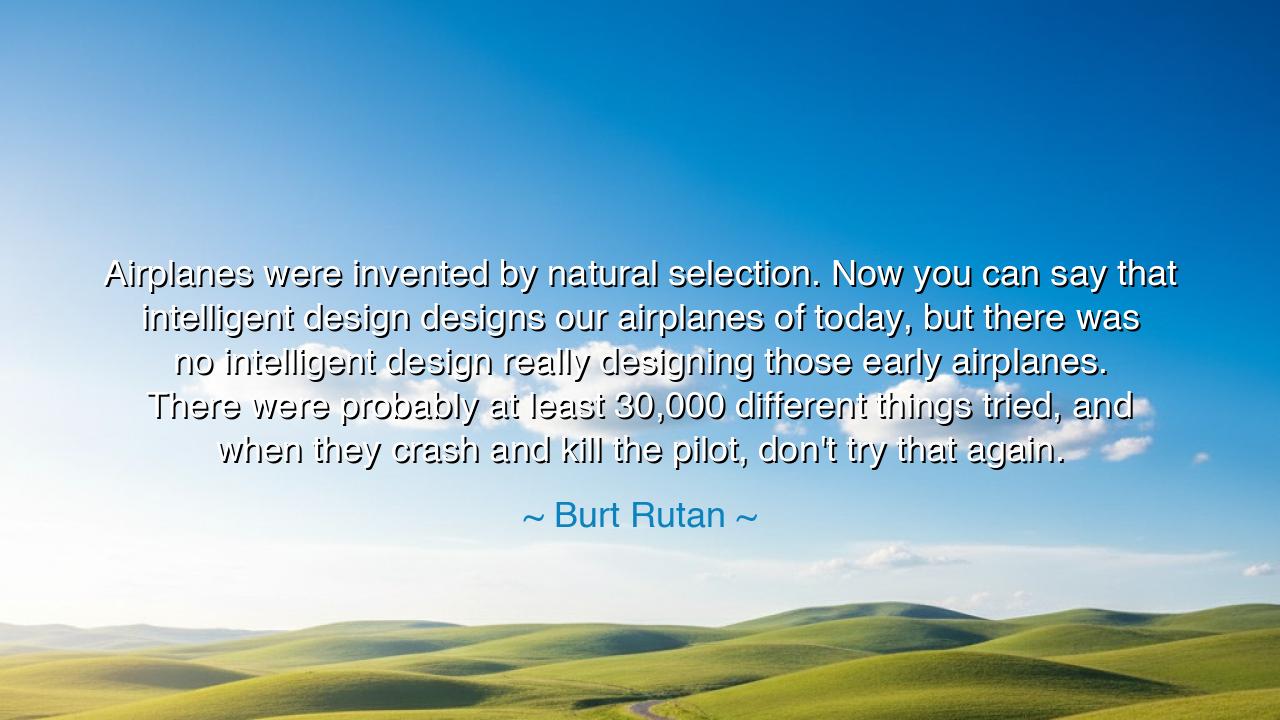
Airplanes were invented by natural selection. Now you can say
Airplanes were invented by natural selection. Now you can say that intelligent design designs our airplanes of today, but there was no intelligent design really designing those early airplanes. There were probably at least 30,000 different things tried, and when they crash and kill the pilot, don't try that again.






“Airplanes were invented by natural selection. Now you can say that intelligent design designs our airplanes of today, but there was no intelligent design really designing those early airplanes. There were probably at least 30,000 different things tried, and when they crash and kill the pilot, don't try that again.” Thus spoke Burt Rutan, the legendary aerospace engineer, whose creations — from the Voyager to SpaceShipOne — carried humankind from the open skies to the edge of space. In these words, Rutan distills a profound truth about invention, perseverance, and the evolution of knowledge. He reminds us that progress is not born from perfection, but from failure refined by courage. Just as life itself evolved through countless trials and adaptations, so too did the dream of flight emerge from sacrifice, from curiosity tempered by risk, and from the relentless spirit of those who refused to surrender to gravity or despair.
When Rutan speaks of “natural selection,” he does not invoke biology alone, but the law of all creation — that through endless experimentation, through loss and correction, the strong ideas endure while the weak fall away. Before there were engineers with equations and wind tunnels, there were dreamers with wood and cloth, with intuition and reckless hope. They built their wings as nature built the birds: by trial, by error, and by death. In those early years of aviation, progress was measured not by triumph alone, but by the wreckage of countless failures — each crash a lesson written in pain, each loss a step closer to the sky.
The origin of this quote lies in Rutan’s lifelong reverence for experimentation — his belief that innovation is evolution made conscious. As a designer, he often defied convention, crafting planes that looked nothing like those before them: sleek, asymmetrical, almost alien in form. Yet behind his success lay the same principle that guided the Wright Brothers at Kitty Hawk, the same force that shaped the natural world — the willingness to try, to fail, and to learn. Rutan understood that no genius begins at mastery. Every invention, every leap forward, is the product of countless unseen attempts that did not work — and of brave souls who dared to make those attempts, knowing they might not live to see their results.
To understand Rutan’s wisdom, one need only look to the history of flight itself. Consider Otto Lilienthal, the German glider pioneer of the 19th century. He was one of the first to study the wings of birds and to build gliders that mimicked their motion. For years, he tested his designs by leaping from hillsides, recording his results with meticulous precision. His work inspired the Wright Brothers — but he himself perished in a crash, uttering the immortal words, “Sacrifices must be made.” In his death, the world gained knowledge; in his failure, future generations found flight. This is the natural selection of innovation — the slow, costly refinement of human dreams until they become reality.
Rutan’s words also echo a deeper philosophy: that intelligence is not the beginning of creation, but its outcome. The early inventors were not “intelligent designers” in the modern sense — they were students of chaos, guided by instinct and the harsh teacher of consequence. Only through centuries of experimentation did humankind earn the wisdom to design with precision. The perfection we see today — in the wings of jetliners, in the spacecraft that pierce the heavens — was not born from divine inspiration, but from the discipline of iteration, from the humility to accept that the path to mastery is paved with failure.
Yet within Rutan’s reflection lies not only technical wisdom, but moral courage. For he reminds us that the pioneers of progress paid dearly for their knowledge. Those “30,000 things tried” were not numbers, but lives — lives offered to the altar of discovery. And still, they tried. Why? Because they believed that to advance the human spirit, one must be willing to fail — to risk the crash in pursuit of the climb. This is the spirit of invention, the sacred fire that moves humanity forward: the refusal to be content with the ground, the audacity to reach for the unknown even when it burns.
So let this be the lesson passed down to all who seek to create, to build, or to dream: do not fear failure — learn from it. Every collapse, every setback, every defeat is not the end, but the necessary pruning that allows the tree of knowledge to grow stronger. Let your craft evolve as the airplane evolved — through persistence, through courage, through an unyielding faith that every attempt brings you closer to truth. Be as nature herself — patient, ruthless in learning, tireless in adaptation. For perfection is not achieved by avoiding error, but by surviving it, understanding it, and rising above it.
And thus, as Burt Rutan teaches, progress is not a miracle — it is a lineage of trial, carried by those who dared to try again. The wings of the modern world were shaped by countless hands, many of which never saw them fly. To honor their legacy, we must continue the same sacred work: to imagine, to risk, to build. When your ideas crash, let them crash in the service of growth; when they soar, let them soar in the name of all who fell before you. For it is through this eternal cycle — this natural selection of the human mind — that we will continue to ascend, higher and higher, into the endless sky.






AAdministratorAdministrator
Welcome, honored guests. Please leave a comment, we will respond soon